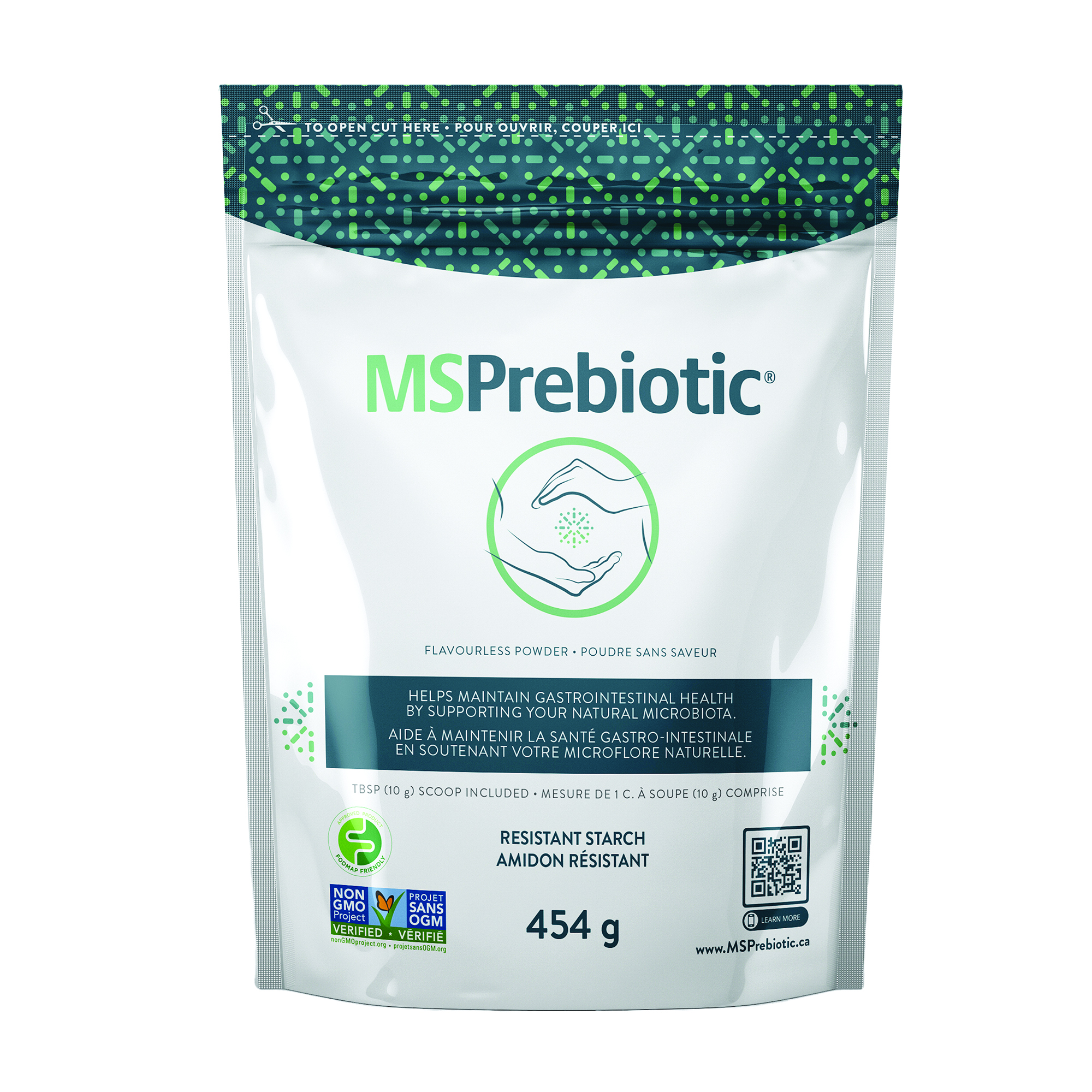I’ve spent a great deal of time over the last several months taking a deep dive into the different ways humans are able to positively influence their gut microbiome via nutrition, lifestyle and supplemental strategies.
A significant majority of the most common health concerns are associated with an imbalance between good and bad gut bacteria, a phenomenon referred to as dysbiosis, which really highlights the importance of a strong understanding in this area.
It also justifies the growing scientific and public interest around the gut microbiome and what we can do to enhance it.
Which brings me to the topic of today’s article and the commencement of an exciting new brand partnership with MSPrebiotic – a resistant starch supplement that has demonstrated potential to positively influence the human gut microbiome.
The research and time required to prepare today’s content was financially sponsored by MSPrebiotic, however the review of the scientific evidence to come and my thoughts on the product are my own.
But wait, what the heck is resistant starch and why is it so good for our gut bacteria?
We’re about to find out.
Let’s get to the good stuff!
An Intro To Resistant Starch
Resistant starch, as the name suggests, is resistant to digestion until it reaches the large intestine where it is slowly broken down by our healthy gut bacteria as a prebiotic fibre.
Prebiotic fibres like resistant starch acts as food, in a sense, for these bacteria and allows them to flourish and out compete harmful bacterial species while also facilitating the production of beneficial compounds known as Short Chain Fatty Acids (SCFAs) which are known for anti-inflammatory and immune and gut health supporting benefits.
There are actually four different types of resistant starch.
Type 1 is found in whole grains, seeds and legumes.
Type 2 is found in unripe (green) bananas and raw potatoes.
Type 3 is found in foods like potatoes and rice only after they have been cooked and cooled.
Type 4 is generally man made via chemical processes.
MSPrebiotic product contains Type 2 resistant starch which is not easy to access via the diet, and it’s also true in general that the average persons total resistant starch intake is not particularly high because the foods that contain it are generally under consumed.
So what happens when your body when you take a resistant starch supplement?
Quite a bit actually, but today we will focus on its effects on the gut microbiome.
Resistance Starch Enhances The Microbiome
In 2017, the results of a human trial exploring the role that resistant starch plays in modifying the human microbiome were published in Clinical Nutrition.
Study participants were divided by age into older and middle-aged categories with each receiving MSPrebiotic or a placebo over a 12-week period.
Changes to the microbiota were measured via stool sample analysis.
Here’s What They Found
Older adults had higher levels of “bad” bacteria at baseline
Which tracks with the commonly held notion that our microbiome balance gradually declines with age.
Resistant starch supplementation reduced “bad” bacteria levels
After 12-weeks of MSPrebiotic supplementation, bad bacteria levels in older adults dropped. The older adults also reported a decrease in stool softener use, likely reflecting an improvement in perceived bowel function.
Resistant starch supplementation boosted healthy bacteria in all participants
Compared to placebo, both older and middle-aged adults experienced a boost in healthy bacteria levels.
Resistant starch supplementation led to less stool softener use
In the older adult demographic, reflecting the enhanced perception of good bowel health.
As we would expect from prolonged exposure to a prebiotic fibre, this study demonstrated the positive influence of type 2 resistant starch on the gut microbiome.
Note: The study participants were not allowed to use a probiotic supplement to ensure the researchers could properly measure the influence of the resistant starch.
The state of the microbiome, of course, also has a significant influence on other aspects of the human body including immune function, inflammation and blood sugar control – so stay tuned for me to explored the role of MSPrebiotic’s in these areas in my future content.
For now though let’s focus on why the results of this study are so relevant, particularly for the older adult demographic.
The Microbiome Changes With Age
A diverse, balanced microbiome is considered one of the predictive factors of healthy aging.
One’s lifestyle over time, including diet and physical activity, have a big role to play in shaping the microbiome which in turn has a big role to play in shaping one’s risk for various health concerns.
In fact, a recently published study out of Nature Aging found that individuals aged 100+ tended to have microbiome profiles that resembled younger people in terms of their microbiome diversity and balance between good and bad bacteria.
It’s certainly not a stretch then to suggest that lifestyle choices that promote a healthy gut microbiome, including resistant starch supplementation, may have a role to play in healthy aging.
Which brings us to today’s product feature – let’s take a closer look at the MSPrebiotic product.
The MSPrebiotic – A Resistant Starch Supplement
In my eyes the easiest way to think of MSPrebiotic is as a functional fibre supplement that offers unique benefits to the gut microbiome via the prebiotic effects of resistant starch.
The product comes in the form of a flavourless powder which can be added to smoothies, oatmeal, yogurt and any other cool drinks or foods.
This is a uniquely useful product for the simple reason that many people do not access much resistant starch in their diet and thus would enjoy real benefits to their microbiome by utilizing a product like this to work with and enhance their healthy gut bacterial populations while suppressing the growth of bad bacteria.
One of the other very cool things about this supplement is that it is FODMAP friendly because resistant starch molecules are fermented very slowly and don’t cause the same GI distress that some other prebiotic fibres might.
Want To Try MSPrebiotic? Discount Code Below!
ANDYRD for 15% off until December 31st and NEW2MSP for Free Shipping on your first order (promo codes can be used together).
Click through the product image below to learn more!
Until next time
Andy De Santis RD MPH




